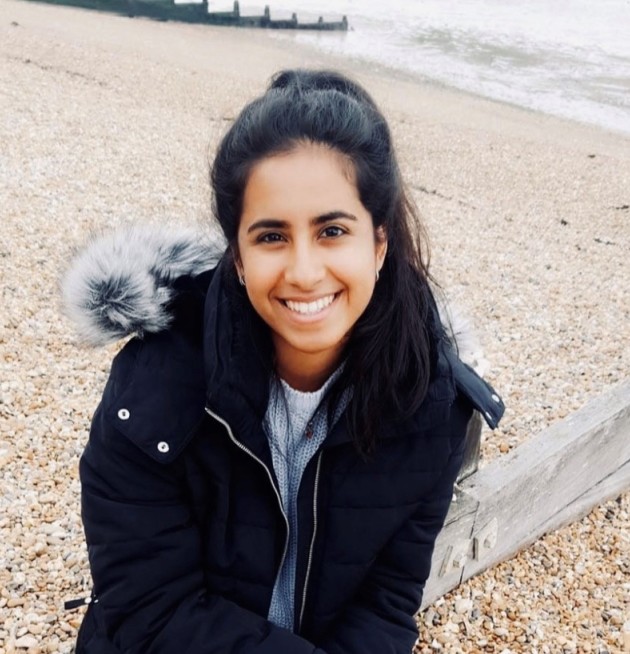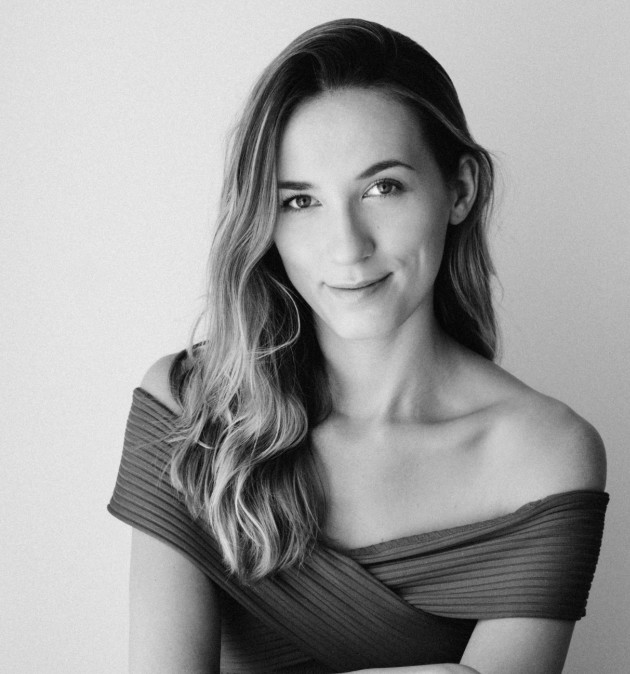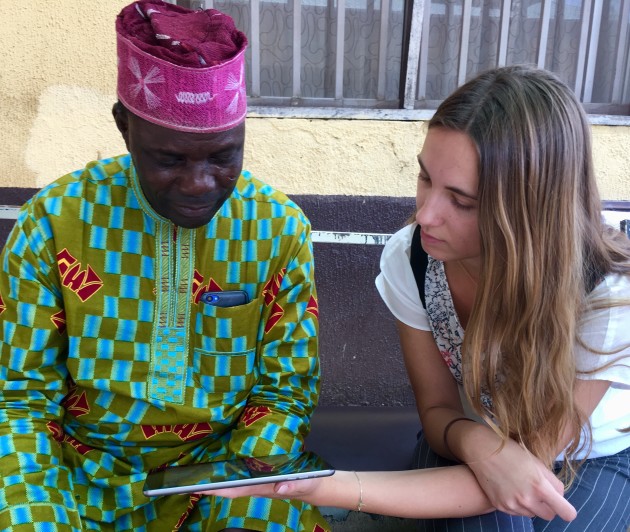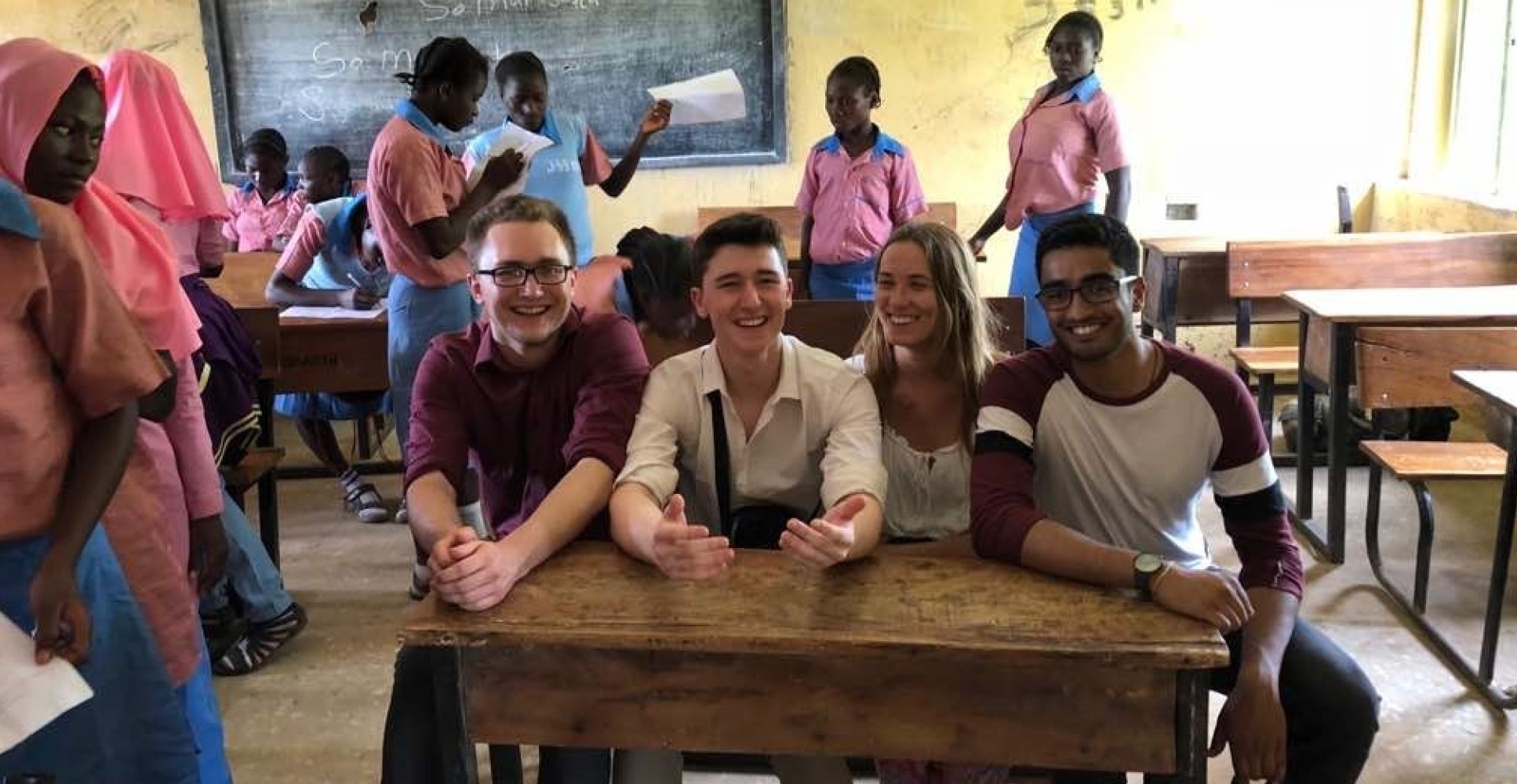Debunking myths about Medical school
In this video, Andrey and Samuel break down 5 common myths about studying medicine.
Keep your stress under control during Interview season
Marianne, a current Medical student, offers some tips on how to manage your stress during interview time.
Top Tips to keep your stress under control during Interview season
Marianne, our current student, would like to give you some tips on how to manage your stress during interview time.
Marianne on MMIs and stress
A day in the life of a final year student at the time of a pandemic
Namrata is taking us with her to her final year placement. Find out what it's like to be a medical student during the Covid19 pandemic.
Being a female medical student at Imperial College School of medicine
Listen to Eva telling us her story, from the perspective of a female medical student at Imperial College School of Medicine.
Eva - 4th Year Medical Student
Equality and Diversity: my experience
by Elsie Ampomah

There are different things that you as a prospective student may consider when applying to university. From the location of the university to the course structure and social life of students who attend the university. These are all things I considered when applying to Imperial. I believe I was drawn most to how the medicine degree was structured into 3 different phases and what was included in each phase. Majority of my feelings towards Imperial before I applied were based on the medicine degree itself and of course, the reputation of Imperial as being one of the best universities in the country. Before applying, I was always aware of the multiple benefits of attending Imperial, however, now as a student I can confidently say that all my expectations were met and even exceeded.
A concern I had when applying to Imperial was to do with the type of support I would receive as a medical student. I was fortunate enough to attend a secondary school and a sixth from whose principal aim was to ensure students received all forms of support. Hence this was a great concern for me as I was accustomed to being in environments where I was able to get help regarding any situation, academic or otherwise. I was also conscious of all the challenges that accompanied studying medicine at such a prestigious university, and I was worried that there was a possibility that I wouldn’t be able to receive the help I needed to adjust adequately and meet the requirements of my degree. These fears I had were further fed by accounts from other students detailing their experiences where they failed to receive support they needed. Although I can not account for the experience of others, I believe that the support I have received from the school of medicine at Imperial has been unmatched. From my academic tutor to older years, the support I have received has certainly amazed me. The countless events, tutorials, clubs and societies etc organised the school of medicine union has allowed me to settle in during my first term.
As an individual who is of African descent, I was disappointed when I realised that there are not a vast number of students who look like me at Imperial and even more so within the school of medicine. That is not by any means to say that Imperial is not diverse. It is one of the most diverse universities in the country, with students from a wide range of different backgrounds. Although there are many students of African or Caribbean descent, we are in no way the majority and I believe that this will only change with more people considering Imperial and applying. However, joining clubs such as the Afro-Caribbean society has enabled me to meet more individuals who look like me. I have also found that there are equal opportunities for all students who attend Imperial, irrespective of one’s background.
Debunking Four Common Myths About Studying Medicine
By Tania Varshney

‘Life is a sum of all of our choices’- Albert Camus.
For some people, the decision to study medicine can be really difficult. For others, it could be the easiest decision they ever make. Whilst you may find yourself taking a different path into medicine than your peers, you will end up at the same destination.
My name is Natania Varshney and I am a fourth year medical student at Imperial College London. This year, I am the Welfare Chair for the School of Medicine’s Student Union, supporting individuals who are facing challenges and dealing with hardship whilst at medical school. The role also involves advocating student views at meetings with Faculty, to improve the wellbeing provisions across campus, and running campaigns to raise awareness about different issues that affect students whilst at university.
In this article, I will be debunking four common myths about studying medicine.
Myth 1: You need to have work experience shadowing a doctor in a hospital.
Why do universities want applicants to have work experience? There are lots of reasons, but the main one is for students to gain a realistic insight into what a career in medicine will involve. Far from being the glamourous career that you might envision having watched Grey’s Anatomy or Casualty, medicine is a challenging career, both mentally and physically, but also an immensely rewarding one. The best way to learn about your future job is to shadow those already doing the job however, if you are struggling to find work experience shadowing a doctor, any healthcare work experience can work in your favour. Work experience can highlight the need for strong teamwork and communication skills, but also demonstrate how all healthcare professionals, from physiotherapists to pharmacists, follow the same common principles of patient centeredness and evidence based practice. To an admissions tutor, work experience demonstrates prior consideration and a commitment to medicine, but most importantly it gives you an opportunity to reflect on your experiences and what they have taught you.
Myth 2: You can only study medicine when you are 18.
For some, heading to university straight from school is the right choice, others choose to take a gap year first and many study medicine as mature students, having studied other degrees or pursued different careers previously. Your path into medicine won’t make you a better or worse doctor, nor will your age. The key thing is to make sure that medicine is the right fit for you.
Don’t be put off from taking a gap year if it is what you want to do - they are a great opportunity to grow as a person, gain life experience and to embark on exciting adventures before starting at university. Try and make sure that you do something to highlight your commitment to medicine during this year off though!
Ultimately, whilst some medical schools have a minimum age requirement for applications to or commencement of medical school, there is no upper age limit. You can become a doctor at any age, there’s no rush!
Myth 3: Work, work, work… and more work!
There is a belief that once you become a medical student, books will become your only friends, the library will become your home and “all nighters” will be the only highlights of your social calendar. As sad and funny as that might seem, studying medicine is all about balancing your work and personal life. Time management is key and, whilst it can be difficult to get things right at first, striking that balance is really important. As a degree, medicine is long and challenging, and this won’t change when you become a doctor. Finding time for hobbies, your friends and yourself is a must, and discovering ways to switch off and blow off steam is vital to make sure you don’t burn out. When applying to medical school, extracurriculars compliment top grades to show that you are a well-rounded, balanced individual who can contribute a lot to the medical school. Don’t be afraid to try new clubs and societies when you come to university too!
Myth 4: Studying Medicine is competitive and you need straight A*s (or Grade 9s).
I remember being 16 and hearing about a frightening statistic that getting into medicine was a 1 in 6 chance. As challenging as the application process can be, it’s all about being confident and playing to your strengths. You do need to have good grades in the right subjects, which reflect an understanding of the principles of physiology and chemistry that underpin it, however it is not true that you need to have straight A*s. Alongside your GCSE and A-Level grades the admissions teams are going to look at other parts of your application, such as your personal statement and extracurricular activities. Don’t underestimate the value of your hobbies and interests outside of your academic pursuits, whether sport, art or music, as these can highlight some of the qualities needed to be a good doctor, such as leadership, communication, teamwork and resilience.
You might also be worried that at university it can be even more competitive, but this is only in very rare cases. Older years are your new best friends, offering everything from advice and top tips on university life and living away from home, to passing down notes and revision tips. Don’t be too concerned about trying to get 100% on your exams, just do your best and whether you are at the top of your year or the bottom, you’ll be a doctor, and a great one too!
Finally, trust yourself and don’t give up. Medicine may be tough to get into, but it is definitely worth it once you get there. Good luck!
Tips for Incoming Students

Academics and Research
Year 2 student Helena talks about the programme and ways to get involved in academic and research

Student Life at Imperial
Video - Year 2 student Helena talks about the student community at Imperial

Preparing for Uni
Medical student takes you through how best to prepare for beginning your studies
Medical student Helena takes you through how best to prepare for beginning your studies at Imperial College London.

Working from Home
Year 2 student Helena explains tips for working from home
Clinical Research and Innovation (CRI) module in year 2: I went to Nigeria!
 By Paulina Cecula, Year 5
By Paulina Cecula, Year 5
Many medical students are driven by making a positive impact. The same reason sparked my interest in global health, which is an area of medicine where you could potentially make an impact on a large scale. Global health is focussed on people across the whole planet rather than the concerns of nations and it recognises that health is determined by problems, issues and concerns that transcend national boundaries’ (Beaglehole, Bonita, 2010).
Imperial has a lot to offer for students interested in global health – whether you are only curious about it or rather confident that it’s something you’d like to pursue in the future- you’ll be able to find something for yourself, for example a BSc in Global Health. One of my favourite experiences during medical school was a Clinical Research and Innovation (CRI) module, which happens in the last term of 2nd year. Although, I am now in my 5th year, I remember the moment when I heard about CRI as if it was yesterday! I thought “this is why I came to Imperial!”. Most of us are interested in gaining research experience, especially while studying at a university known for its research, however the path to getting involved is often unclear. CRI bridges the gap. It offers 2nd year medical students a chance to get involved in various projects, from sequencing their own DNA, virtual reality and neural regeneration to community care in remote and deprived regions. Not only it helps us develop or grow an interest in a particular area but also enables us to develop research skills (data collection, analysis and presentation).
 I was lucky to go to Abuja, Nigeria for my 3-week long CRI experience that was organised with a collaboration of a local NGO. Together with two other students, we investigated if HIV self-tests a cost-effective alternative for increasing the number of HIV tests conducted in an adult rural Nigerian community compared to expanding primary healthcare services. However, our experience was so much more than just the project itself. We visited many hospitals, schools and attended healthcare management meetings to learn more about the local healthcare system which allowed us to appreciate their unique challenges and differences between the systems.
I was lucky to go to Abuja, Nigeria for my 3-week long CRI experience that was organised with a collaboration of a local NGO. Together with two other students, we investigated if HIV self-tests a cost-effective alternative for increasing the number of HIV tests conducted in an adult rural Nigerian community compared to expanding primary healthcare services. However, our experience was so much more than just the project itself. We visited many hospitals, schools and attended healthcare management meetings to learn more about the local healthcare system which allowed us to appreciate their unique challenges and differences between the systems.
 The experience also had its challenges. We were thrown into a completely new environment, some of us being that far abroad for the very first time. The trip was sometimes emotionally heavy, especially when visiting rural parts of Abuja where we witnessed a huge disparity between wealthy and poor. We had a chance to appreciate cultural differences and understanding our privileges and things we take for granted. I’ve chosen to apply for the placement in Nigeria as I wanted to learn more about the work that NGOs do in developing countries and test my interest in global health. I believe I gained much more. The whole experience, and especially those various challenges, contributed to my personal growth and will do over years to come.
The experience also had its challenges. We were thrown into a completely new environment, some of us being that far abroad for the very first time. The trip was sometimes emotionally heavy, especially when visiting rural parts of Abuja where we witnessed a huge disparity between wealthy and poor. We had a chance to appreciate cultural differences and understanding our privileges and things we take for granted. I’ve chosen to apply for the placement in Nigeria as I wanted to learn more about the work that NGOs do in developing countries and test my interest in global health. I believe I gained much more. The whole experience, and especially those various challenges, contributed to my personal growth and will do over years to come.

Top tips for working from home
by Pylin Parkes, Year 4
Working from home sounded great at first: no crowded commute, all-day pyjama wear, the list could go on and on. However, I soon realised (alongside a significant proportion of the world’s population), that it can be quite hard to resist naps, snacks and other distractions which just leads to stress. So how can we combat this? Well, through some trial and error, I’ve come up with 5 pieces of advice to help you sail through remote working.
1. Find a dedicated study space
No one wants their entire home to become a replacement library/study room, that makes it hard to relax. It’s also not ideal to have work interrupted every 5 minutes by noisy household members, or the TV enticing you to binge-watch your latest Netflix obsession. So find a space in the house that is quiet and can be used solely for studying. You don’t need a whole room, just a desk in your bedroom will do. But try to only do work at that desk and relax somewhere else. Then your brain will associate the area with work and get you into study-mode as soon as you sit down.
2. Have a routine
It’s easy to burn out if you there’s no official beginning and end to the workday. It’s also hard to get started if you’re not sat in a classroom. Make a timetable for the hours you will work every day and try to be realistic and consistent. Not sure how? A good starting point is to make a timetable similar to your old working patterns such as during school. But don’t forget to schedule in adequate breaks since a productive student is a well-balanced one, not a frazzled one.
3. Minimise distractions
I bet the first thing you thought of was your oh-so-tempting-phone. Try putting it in another room while you work, or place the screen facing down. Also, the pomodoro technique is great for people with short attention span and in need of motivation to work (me). Set a timer for 25 minutes of uninterrupted work, then a 5 minute break, and repeat. After 4 rounds, you can take a longer break. This can keep you productive and efficient if you aim to finish a small task each round, and motivated since you’re resting regularly.
4. Stay social
Studying can get boring but working with friends over video-calls can boost motivation and creativity. Talking can remind you of why you enjoyed your chosen subject in the first place, and help you get through difficult topics. Or at least they make your breaks more interesting!
5. Be kind to yourself
This includes being realistic and flexible. Don’t sweat it if your routine isn’t working for you anymore. For a couple of days, maybe cut down on your work hours and focus on efficiency, switch tasks or change your workspace. Also, look after your physical and mental health by going outside for some sunshine and keep up the hobbies that you can do from home.
We’re all adapting so if you’re struggling please reach out for help, you’re not alone!



